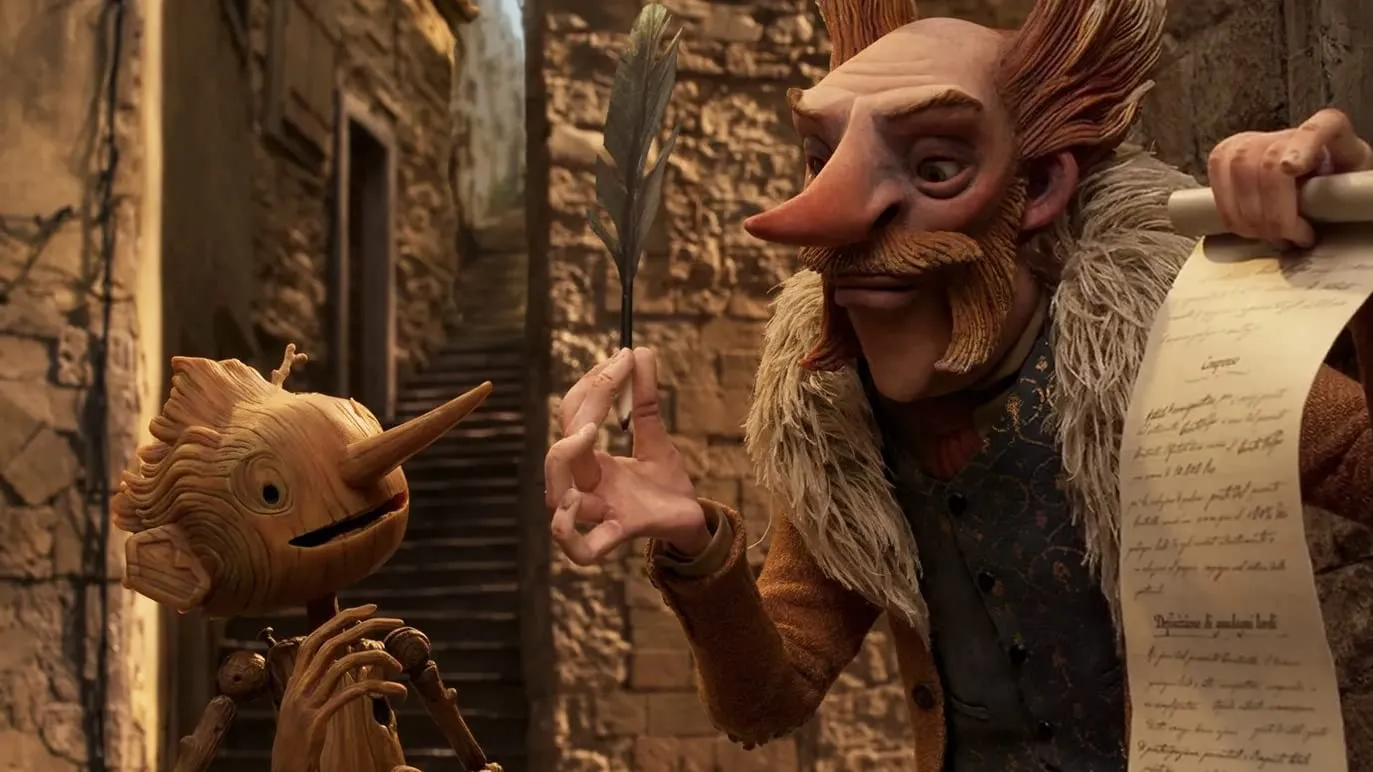
Film Review: Guillermo del Toro’s Pinocchio
Film Reviews
Guillermo del Toro’s Pinocchio
Directors: Guillermo del Toro, Mark Gustafson
The Jim Henson Company and ShadowMachine
In Theaters: 11.18
Streaming on Netflix: 12.09
Nothing that’s perfect can ever be remade just as it was before; you must allow it to stand on its own. This statement applies whether you’re a woodcarver or a filmmaker, and it’s the key to the new stop-motion animated film Guillermo del Toro’s Pinocchio.
The latest film version of Carlo Collodi’s oft-told classic instantly establishes a unique take by setting the story in the 1930s with Italy in the grip of Benito Mussolini’s fascist regime. Geppetto, voiced by David Bradley of the Harry Potter films, Doctor Who and Game of Thrones, is the loving father of a son named Carlo, who is tragically killed when a bomb is dropped on their small village. After attempting to drown his sorrows in alcohol, the heartbroken Geppetto cuts down the tree that he planted with Carlo and uses it to painstakingly craft a son, one who cannot be killed because he’s not alive.
Of course, we know that the wooden boy doesn’t remain inanimate: A magical Wood Sprite (Tilda Swinton) appears and gives the boy made of pine the gift of life, as well as the moniker of Pinocchio. The titular boy (endearingly voiced by Gregory Mann) begins his quest to learn all about what it means to be human with the help of one Sebastian J. Cricket (Ewan McGregor) to guide him on an enchanting and often dark journey through the ups and downs of life.
Del Toro and his co-director, veteran stop-motion artist Mark Gustafson (whose previous credits include A Claymation Easter and The PJs), are committed to giving us a gorgeous and stylistically innovative visual treat, and even if Guillermo del Toro’s Pinocchio were merely a faithful and straightforward telling of Collodi’s original novel, the sheer beauty of the animation would be enough to make it stand out.
That wouldn’t be enough for a Guillermo del Toro film, however, and the Oscar winner (for The Shape of Water) provides an inspired take on the material, recalling Pan’s Labyrinth with his combination of dark fantasy set during a much darker reality. Here, Del Toro makes a clever connection between the puppeteering of fascist government and the tale of a puppet transcending his own limitations to become something more. There’s a timely resonance here as fascist ideology in America has become a constant and inescapable presence. The story of the boy whose nose grows every time he tells a lie is perfectly suited for dark commentary on the era of “alternative truth,” and in this version, Pinocchio’s lesson—that goodness isn’t about listening to what you’re told to do but who you should and shouldn’t listen to—takes on an added weight.
This socio-political commentary is perhaps most effectively drawn through two significant characters: The Podestà (Ron Perlman Hellboy), a powerful local leader who sees an immortal wooden boy as a potential super soldier. Candlewick, the Podestà’s son, is memorably portrayed by Finn Wolfhard, boldly reinterpreted as a tragic figure who, in this case, is being groomed by his father and the state to become a figurative jackass whether he wants to or not.
All of this weighty subject matter and social commentary could have easily become too disturbing or too on the nose (no pun intended) in the hands of a lesser filmmaker. Del Toro manages to find the right mix, relying on MacGregor’s wonderful comic performance and Mann’s sincere, lovable exuberance to balance things out. The gorgeous and lively score by Alexandre Desplat, and the heartfelt emotion of Bradley’s portrayal of Gepetto, bring depth to both the joys and sorrows of the story.
Guillermo del Toro’s Pinocchio is an inspired labor of love, a dream project for the director that has been a long time in the making, and manages to stand out in a year that is overflowing with top-tier animated films. Grown-up animation buffs owe Netflix a vote of thanks for giving us the chance to experience this towering achievement on the big screen. –Patrick Gibbs
Read more from Patrick Gibbs:
Film Review: Enola Holmes 2
Film Review: The School for Good and Evil
